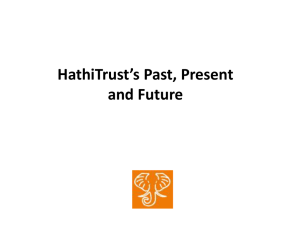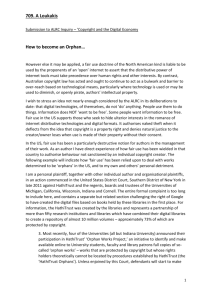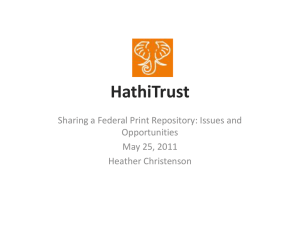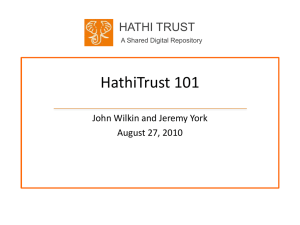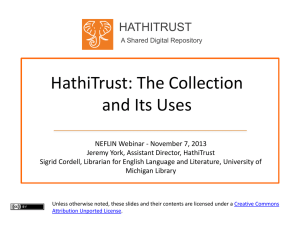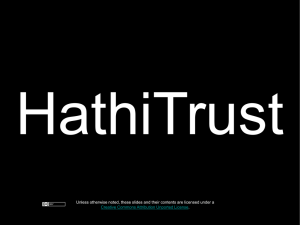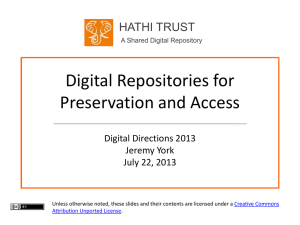HT Ingest Checklist for Local Packaging This checklist is
advertisement
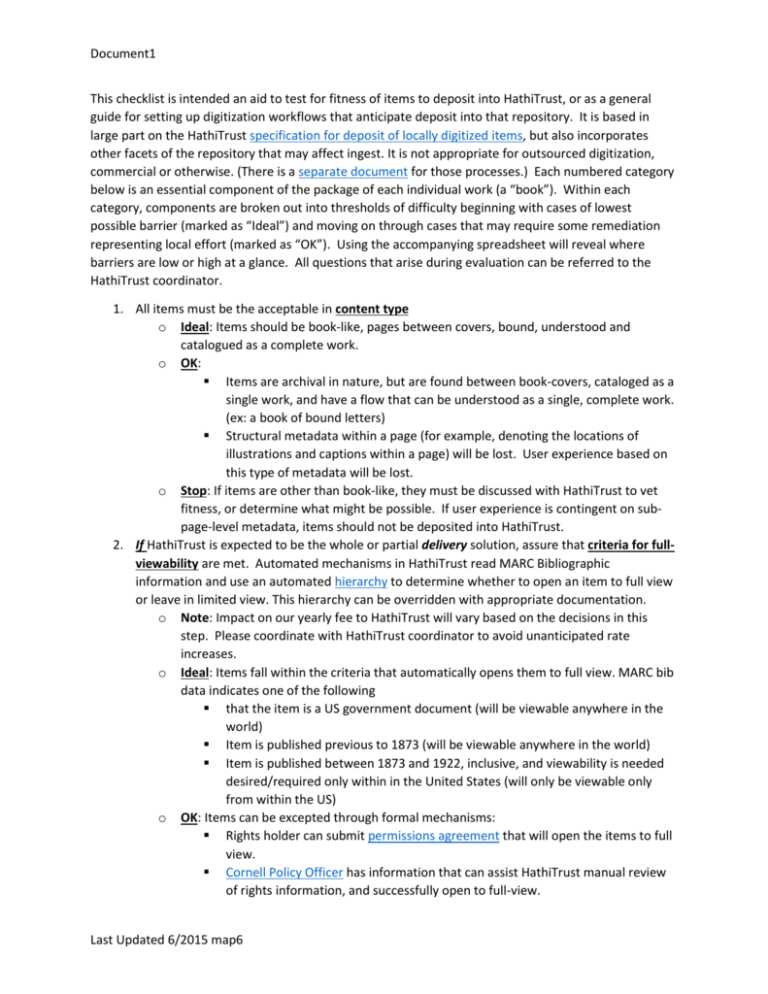
Document1
This checklist is intended an aid to test for fitness of items to deposit into HathiTrust, or as a general
guide for setting up digitization workflows that anticipate deposit into that repository. It is based in
large part on the HathiTrust specification for deposit of locally digitized items, but also incorporates
other facets of the repository that may affect ingest. It is not appropriate for outsourced digitization,
commercial or otherwise. (There is a separate document for those processes.) Each numbered category
below is an essential component of the package of each individual work (a “book”). Within each
category, components are broken out into thresholds of difficulty beginning with cases of lowest
possible barrier (marked as “Ideal”) and moving on through cases that may require some remediation
representing local effort (marked as “OK”). Using the accompanying spreadsheet will reveal where
barriers are low or high at a glance. All questions that arise during evaluation can be referred to the
HathiTrust coordinator.
1. All items must be the acceptable in content type
o Ideal: Items should be book-like, pages between covers, bound, understood and
catalogued as a complete work.
o OK:
Items are archival in nature, but are found between book-covers, cataloged as a
single work, and have a flow that can be understood as a single, complete work.
(ex: a book of bound letters)
Structural metadata within a page (for example, denoting the locations of
illustrations and captions within a page) will be lost. User experience based on
this type of metadata will be lost.
o Stop: If items are other than book-like, they must be discussed with HathiTrust to vet
fitness, or determine what might be possible. If user experience is contingent on subpage-level metadata, items should not be deposited into HathiTrust.
2. If HathiTrust is expected to be the whole or partial delivery solution, assure that criteria for fullviewability are met. Automated mechanisms in HathiTrust read MARC Bibliographic
information and use an automated hierarchy to determine whether to open an item to full view
or leave in limited view. This hierarchy can be overridden with appropriate documentation.
o Note: Impact on our yearly fee to HathiTrust will vary based on the decisions in this
step. Please coordinate with HathiTrust coordinator to avoid unanticipated rate
increases.
o Ideal: Items fall within the criteria that automatically opens them to full view. MARC bib
data indicates one of the following
that the item is a US government document (will be viewable anywhere in the
world)
Item is published previous to 1873 (will be viewable anywhere in the world)
Item is published between 1873 and 1922, inclusive, and viewability is needed
desired/required only within in the United States (will only be viewable only
from within the US)
o OK: Items can be excepted through formal mechanisms:
Rights holder can submit permissions agreement that will open the items to full
view.
Cornell Policy Officer has information that can assist HathiTrust manual review
of rights information, and successfully open to full-view.
Last Updated 6/2015 map6
Document1
o
Stop: Items cannot be guaranteed to meet criteria; delivery from HathiTrust cannot be
assured. Note that items can still be deposited into, but not delivered from, the
HathiTrust repository.
3. All items must have a reliably unique item identifier
o Ideal: items were barcoded at time of digitization, and the barcode was recorded in the
item’s metadata.
o OK:
Barcode can be discovered; work with Lydia Pettis, Joanne Leary or Michelle
Paolillo to construct MS Access Query appropriate for discovery.
Another identifier exists; work with HathiTrust coordinator to map items to
correct namespace in HathiTrust
an identifier can be derived from current metadata; work with HathiTrust
coordinator to create new namespace and correctly map items on ingest
o Stop: Conditions for assigning unique identifiers cannot be met or are too costly.
4. All items must have adequate MARC XML supplied for deposit that conforms to the HathiTrust
bibliographic specification. We already have code that produces acceptable MARC XML from
the Voyager catalog which can likely be modified to meet needs associated with local
submission.
o Ideal: Items were barcoded, cataloged in Voyager and barcode information was
recorded in items metadata.
o OK:
Items were cataloged and barcodes can be associated
Items are housed in a system with metadata that contains MARC XML.
Items have some identifier in them (e.g.: OCLC, LCCN, ISSN) that can be used to
call another system to reliably produce MARC XML.
o Stop: MARC XML cannot be supplied.
5. All items must be acceptable in image specification and naming
o Ideal:
Format: images containing all page faces sequentially from the outside front
cover to the outside back cover.
File format, resolution and color depth:
Pages containing text only, or B&W drawings:
o 300ppi 10 level gray { png | jp2k | jpg }
o 600ppi binary { G4 tiff }
Pages containing illustrations:
o 300ppi gray or color as appropriate
o { png | jp2k | jpg }
File specification is noted in file headers.
Naming: Each image must be named sequentially as found through the book,
beginning at the outside front cover: 00000001.tif, 00000002.tif, 00000003.jp2,
etc.
o OK:
Items do not meet the above guidelines, but can be remediated to meet them.
Note: if the file headers lack specification, this does not require remediation;
this can be handled by the meta.yml file, as described below.
Last Updated 6/2015 map6
Document1
Items can be excepted through negotiation with HathiTrust (“Note from Mom”).
Refer to HathiTrust coordinator for facilitation of this step.
o Stop: items cannot be remediated or excepted as above.
6. Each image file must have accompanying OCR
o Ideal:
OCR must be Plain text, UTF-8 encoded character set.
One OCR text file per image file, and must be named to correspond to
appropriate files. (Example: the OCR file for 00000001.jp2 MUST be named
00000001.txt)
o OK: OCR is lacking, but can be created.
o Stop: OCR is lacking and cannot be generated.
7. Each item must have an accompanying meta.yml file. This file contains resolution and
provenance information that is read in the absence of embedded metadata in the image files,
preservation information, and structural information that HathiTrust can transform to METS
structural data. File is plain text. Format should be after the example at
https://docs.google.com/document/d/1iAcgd1zgrVXw3E2enuH6nx_H0qV9wE_XOgQCDxJDuxc/e
dit
o Ideal:
File can be easily derived through existing metadata.
o OK:
Required values for file can be discovered through project documentation and
supplied.
Required values can be reasonably guessed.
o Stop: Required values cannot be discovered or guessed.
The following information is noted for general awareness.
1. Packaging: Each item is represented by a ZIP file. Each ZIP file is named after the identifier of
the items, and contains
o No nested folder structure (Use only one container for all files.)
o An image file for every page of the item, including the inside and outside cover.
o All OCR text files, one for each image file. (Include blank text file for pages without
words.)
o The meta.yml file
o A plaintext file named checksum.md5, which contains a MD5 checksum manifest for all
other files in the package (image files, OCR files and the meta.yml file).
File includes checksum (md5) and filename for each image and OCR text file and
the meta.yml file.
Compute the checksums after all remediation and alteration are done; just
previous to packaging to assure that each MD5 hash is correct for each file in
the package.
2. Submission:
o Packaged items are placed in Box for pickup. Coordinate with the HathiTrust
Coordinator for access.
o MARC XML for all items (one file with multiple records is fine) is submitted to Zephir.
Coordinate with the HathiTrust Coordinator for delivery.
Last Updated 6/2015 map6
Document1
o
Ingest reports allow for tracking and remediation of deposit.
Last Updated 6/2015 map6
